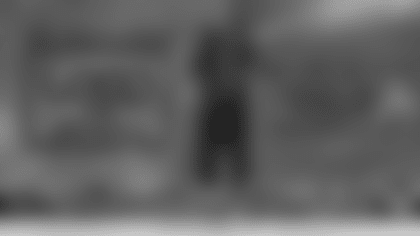A Question-Answer Session with Colts Rookie Center Jamey Richard
Center Jamey Richard, a rookie from the University at Buffalo, is expected to start in place of three-time Pro Bowl selection Jeff Saturday on Sunday when the Colts visit the Cleveland Browns. For Richard, it will be his sixth NFL start and his third at center, having played in place of Saturday in the first two games of the season and having started at left guard three games in October. Richard, after playing sparingly in the first three games of November, replaced an injured Saturday in the first half of Indianapolis' 23-20 victory over the San Diego Chargers this past Sunday and fared well working against San Diego defensive tackle Jamal Williams. A seventh-round selection in the 2007 NFL Draft, Richard this week took time to talk to Colts.com about his whirlwind rookie season, how his early-season experience helped him Sunday and how he was so prepared for his NFL opunity.
Question: You started the first two games of the season at center, then this past Sunday, had to replace Jeff Saturday against one of the top nose tackles in the NFL – Jamal Williams of San Diego. How important was the early-season experience?
Answer: I feel like the earlier experience definitely helped me, as opposed to sitting around through the year and not getting any playing time. It definitely eased the tension of getting in there. I think getting thrown in at the beginning – obviously, I was nervous, but had I not had that opportunity to prepare to start a game, going in in the middle of a game would have been extremely difficult. The amount of reps you take with the first offense are a lot higher when you're starting, so that gave me a lot better preparation than, say, being thrown in in the middle of a game.
Q: You spent the last three or four weeks working mainly as a backup. People expect veterans to be able to step in at a moment's notice, but how were you able to do it as a rookie?
A: It's really something that I think is individual. I just kept telling myself every week to be ready. It's a different attitude between, 'I'm not going to play tonight so let's throw the pads on and go stand there and be a cheerleader,' and thinking, 'OK, there's a good shot I may have to play tonight and I need to be ready.' I bring my notebook with me on every trip so I can look over my notes and stuff like that. I just kept telling myself I had to be ready, because if I got that opportunity, I wanted to be prepared.
Q: When you were drafted, could you ever have laid out the year you've had? It would have been hard to imagine this . . .
A: Absolutely not. When I got drafted, they took three centers off the draft board. Obviously, when they took (guard) Mike (Pollak in the second round), they were planning on using him as a guard, but I didn't know that that day. It was something you probably kind of thought might be the case, but being the third center taken, I was in disbelief on draft day. My brother actually made a joke right before I got drafted, when the Colts came up on the clock. He said, 'Hey, maybe they'll take a third center.' Then, they did. It was absolute disbelief at that point, but you can't imagine the year you're going to have. Never did I think as a seventh-round pick that I would even get on the field in the offense this year. I felt like that was something I'd have to wait maybe a year for, but it came a lot earlier. It came in the first game.
Q: That said, there was never a sense of you being overwhelmed, or not being confident you could do the job. Did you feel as ready as you acted?
A: Obviously, there were a lot of things going through my head. There were a lot of nerves, but I always thought the most important part was that if I could make everyone else believe in me it would be easier to believe in myself. If the people around me were confident in what I was going to do, it would be easier for myself to be more confident because I wouldn't have to worry about feeling as though they were worried about what I was going to do. It would allow me to keep my mind clear.
Q: Still, somewhere inside you must have been confident. For real.
A: I did feel confident. I felt confident when I went in the game the other day, but there are still some nerves there. It's just a matter of managing those nerves. It has been that way for as long as I've played football. Every time I go out in the game there is an amount of nerves. I feel like everybody who plays the game of football has an amount of nerves when they get in the game. It's just the people who play well are those who can control their emotions.
Q: You had your chance to play early, then you had a few games to sit and observe. When you were observing, how much did having played before help?
A: I think that having played early helped me stay in the game for the fact that I knew I could be put onto the field at any point. Had I not been in as early as I'd been, maybe it would have been as much of a connection for me on the sidelines.
Q: Jeff is a 10-year veteran who has been to the last three Pro Bowls as a starter. What have you had a chance to learn from him this season?
A: Jeff's good and he has definitely helped me with a lot of things. It's not just Jeff. People like (guard Ryan) Lilja have helped me with things, whether it's just questions or something they saw that I did that they thought I should change technique on, or tweak, or, 'Don't go at this guy like this. Hit him like that. Move your body over here.' Just things like that – head placement, hand placement . . . Jeff has been doing it a long time and he definitely has a lot of perspective that I'd be crazy not to listen to.
Q: How much more confident do you feel now than you did the first two games?
A: I feel like I'm just as confident as I was the first week. Every opponent is different. You can't rely on what you have done in the past. You just have to prepare for every week the same as you prepare for any other week. That's what I plan on doing.
Q: The rookie season is a whirlwind for any player, that's particularly true in your case. Do you ever think about how much life has changed in a year?
A: I never really think about what it was like at this point last year, but actually a week ago was the first time it kind of hit me. I thought back on it because my college team is bowl eligible for the first time, so their season is going to continue on. At this point last year, I had one week left and after this Saturday coming up last year was when I began the process of picking an agent, finding where I was going to train – the journey of getting here.
Q: It has been some year . . .
A: Absolutely.
Q: Do you have an appreciation now for what an endurance test an NFL season can be?
A: It's a long year. If you add the preseason, those five games, we finished the college season a few weeks ago. That's with a bowl game and maybe a conference title game as well. It's definitely a long year. A lot of times they talk about younger guys not being able to make it through the year, but the fact that I had been out of the lineup for a while I think at this point is a blessing for me to help me make it through the year.
Q: So your approach this week likely doesn't change much . . .
A: The only difference is the amount of reps.
Q: One thing that people have noticed about you this season is just how prepared you have seemed for the NFL, and for this opportunity. Coming from Buffalo, a smaller college football program, to what do you attribute that?
A: I don't think people give Buffalo enough credit sometimes for the type of football we play. It would be one thing if our non-conference schedule was I-AAs and IIs, but we're going to Wisconsins and Penn States and this year, we played Pitt. We're playing a lot of good football teams and we're getting out there in front of a lot of big crowds. At Penn State, there were over 100,000 people. Turner Gill's doing a great job with that program and the guys in that program, allowing them to prepare for situations like this. If you play every week in front of 10,000, 15,000 people, and then you try to come to this level then, yeah, there's going to be an awe to how many people are watching you, but when you get in front of that many people in college, it allows you to gain a familiarity with it.
Q: So then, what's the biggest difference between college and NFL?
A: I've said it before. All good players in the league at one point were in college. The difference between college and the NFL, really, is that you go from having teams with a handful of great players to a team full of great players. Everybody who's here deserves to be here and everybody who's here is a good player. It's really just taking guys in college and weeding a few out and whittling it down a little bit. That's what the NFL is.














